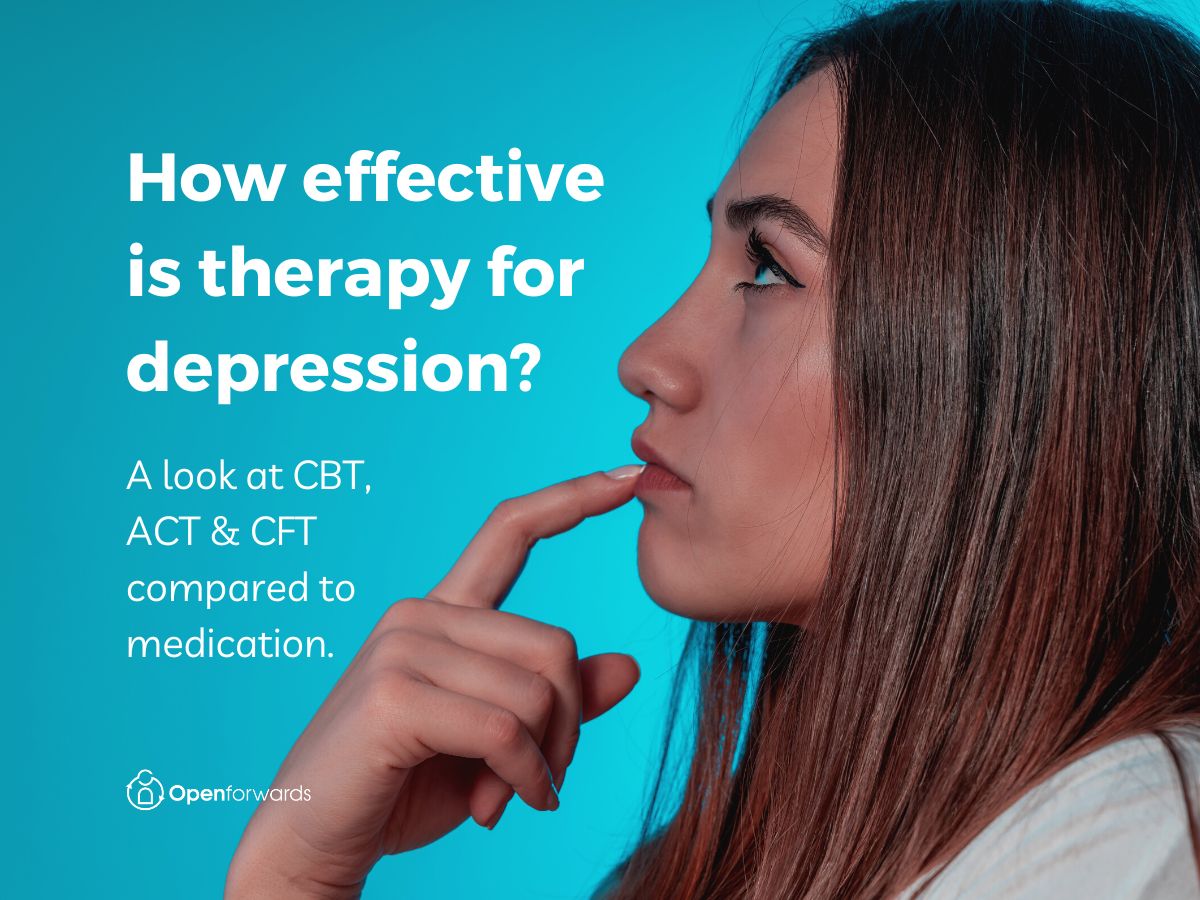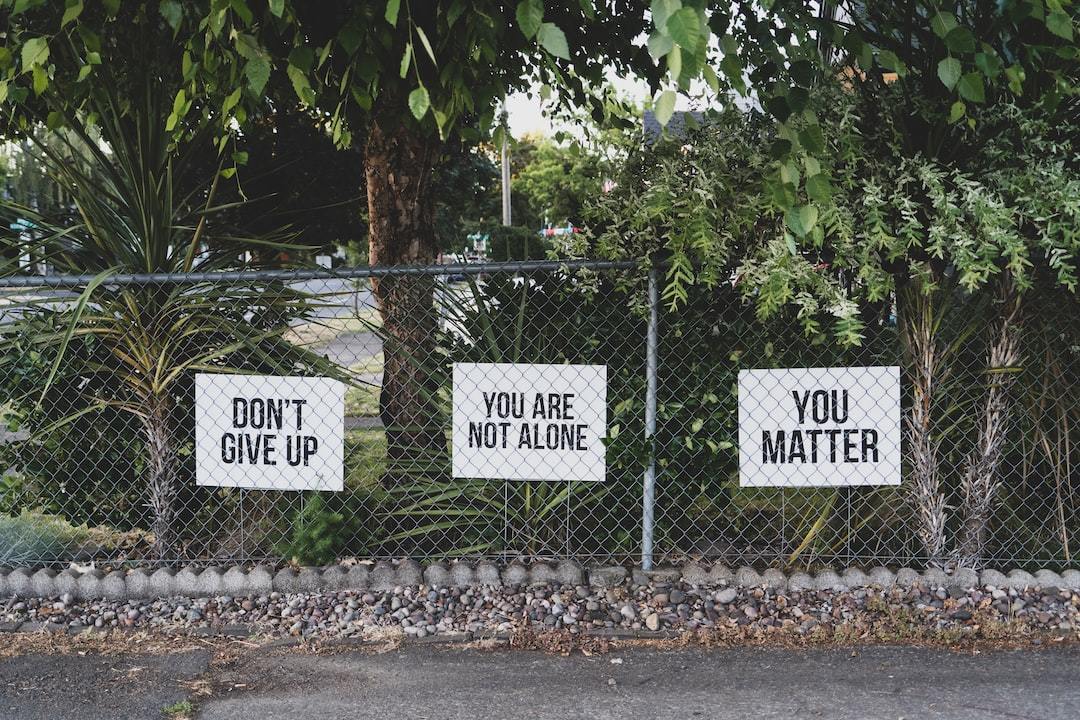
Are you thinking about how therapy might help with your depression? Then you’ve come to the right place.
Therapy has become an increasingly popular and effective method of treating depression. Understanding the advantages and differences between the various therapeutic techniques will help you choose the best option.
In this article, we’ll explore my three favourite therapies for depression. They are:
- Cognitive Behavioural Therapy (CBT)
- Acceptance and Commitment Therapy (ACT)
- Compassion Focused Therapy (CFT).
I’ll discuss their effectiveness compared to antidepressant medications and delve into what may be considered the fastest way to treat depression.
By thoroughly understanding the different therapies, you or a loved one suffering from depressive symptoms can make an informed decision regarding your mental health and begin healing.
This article will explore the following:
- What is Depression?
- Benefits of Therapy for Depression
- Cognitive Behavioural Therapy (CBT)
- Acceptance and Commitment Therapy (ACT)
- Compassion Focused Therapy (CFT)
- Is Therapy Effective for Depression?
- Is Therapy Better Than Anti-Depressants?
- What is the Fastest Way to Treat Depression?
- FAQs concerning Therapy for Depression
- Understand the Benefits of Therapy for Depression to choose your path to recovery.
What is Depression?
Depression, also known as major depressive disorder, is a common mental health condition affecting millions worldwide. Depression most likely results from psychosocial factors such as trauma or loss.
Many people go to therapy for depression without knowing why they feel depressed. However, after some deeper exploration, they often discover various plausible possibilities. For example, many clients realised their depression started following a family breakdown in their teens. Rather than the breakdown directly causing depression, they often found themselves alone, attempting to handle their emotions independently. Naturally, they learned to withdraw, distract and bury their feelings.
What else would a young person do, especially when everyone in the family is hurting and struggling?
What about biological factors? Do they cause depression?
However, many scientists suggest that genetic and neurological factors also contribute to the rise of depression. Evidence to support these assumptions is questionable and heavily influenced by the commercial interests of pharmaceutical companies.
What are the symptoms of depression?
Symptoms of depression include feeling empty or numb, hopeless, physically and emotionally exhausted, disturbed sleep, and brain fog, making it difficult to make decisions. In severe cases, it can lead to suicidal thoughts or attempts.
Symptoms:
- Persistent low mood or empty feeling
- Increased Anxiety
- Thoughts of “what’s the point?”
- Self-critical thinking patterns
- Loss of interest in activities
- Trouble sleeping or oversleeping (in part due to a drop in activity)
Depression is a serious condition that requires proper treatment. Various treatment options are available if you are suffering from depression. These include:
- Treating Depression with Therapy: Therapy is an effective treatment option for depression. NHS Talking Therapy Services (IAPT) offer Cognitive Behavioural Therapy (CBT) and Interpersonal Psychotherapy (IPT). NICE Guidelines for the treatment of depression recommend these two approaches. CBT helps individuals identify negative thought patterns and unhelpful habits that lower mood. You learn to lift your mood through behavioural activation and mindfulness-based cognitive therapeutic techniques. IPT focuses on improving relationships and communication skills.
- Treating Depression with Medication: Antidepressant medications [Selective Serotonin Reuptake Inhibitors (SSRIs) / Tricyclic Antidepressants] can alleviate symptoms of major depression. However, it is not clear how they work, and evidence suggests that most of the benefits come from a placebo rather than any active ingredient in the drug itself.
- Treating Depression with Light Therapy: Light therapy involves exposure to bright light to help regulate mood and improve symptoms of depression. It is often used in conjunction with other treatments.
- Treating Depression with Electroconvulsive Therapy (ECT): ECT is an intrusive, risky medical treatment that passes electrical currents through your brain to produce therapeutic effects. It is typically used for severe depression or when other treatments are ineffective.
- Treating Depression with Group Therapy: Group therapy involves meeting with others experiencing depression. It can help reduce feelings of isolation and provide support. While we don’t offer group therapy at Openforwards, you may be able to access it through the NHS.
- Treating Depression with Herbal Remedies: Some herbal remedies, such as St. John’s Wort, have been shown to help with depression symptoms.
It is important to note that depression is a complex condition, and what works for one person may not work for another. It is important to choose an approach that fits you and your worldview.
Can I prevent Depression?
Reducing stress, staying active, and maintaining a healthy diet can all help to prevent depression and reduce the probability of relapse.

Here are my top three benefits of treating depression with therapy instead of medication:
- Mental health: Therapy improves mental health by targeting unhelpful thinking patterns such as rumination and self-criticism and encouraging you get more active with the values that give meaning and fulfilment to your life.
- Anxiety disorders: Many depressed people also suffer from anxiety; therapy addresses both conditions simultaneously.
- No side effects: Unlike antidepressants [selective serotonin reuptake inhibitors (SSRIs) and Tricyclic Antidepressants], which may cause libido problems or other adverse effects, therapy is a safe alternative without physical risks.
Cognitive Behavioural Therapy (CBT)
Cognitive Behavioural Therapy (CBT) is widely available in Birmingham and throughout the UK because it is an effective treatment for depression. It focuses on identifying and changing negative thought patterns, which can contribute to feelings of depression. CBT helps you develop healthier coping mechanisms and improve your overall mental health by addressing these thoughts.
During a typical CBT session, the therapist works with you to identify specific thoughts or beliefs that may be causing distress. They then explore alternative perspectives and challenge unhelpful thinking patterns through challenging negative automatic thoughts or behavioural experiments.
Not only does CBT deliver positive results in treating major depression, it often reduces stress levels, and prevents it from re-occurring in the future.
CBT is one of the most effective treatments for depression and is often used with other treatment options, such as medication.
Acceptance and Commitment Therapy (ACT)
Acceptance and Commitment Therapy (ACT) is another effective approach for managing depressive symptoms. ACT focuses on helping people carry their thoughts and feelings rather than trying to change or suppress them. This approach promotes taking action based on one’s values, regardless of emotions such as fear, sadness or anger.
In one study, depressed patients who underwent ACT experienced significant improvements in their mood compared to those receiving traditional cognitive behavioural therapy. By fostering psychological flexibility, ACT can help reduce stress and prevent depression from worsening.
Compassion Focused Therapy (CFT)
CFT is an approach that uses elements of cognitive-behavioural therapy, evolutionary psychology, and Buddhist practices to foster self-compassion and understanding to address the psychosocial causes of depression. CFT combines these practices to address the psychosocial causes of depression, such as trauma or negative thought patterns. By developing a kinder attitude towards themselves, individuals with depression often cultivate better mood and overall mental health. Here are a few benefits of a compassion-focused approach to treating depression:
- Fosters self-compassion: CFT encourages individuals to be more understanding and forgiving of themselves.
- Addresses underlying issues: CFT helps identify and tackle the root causes of depression.
- Promotes emotional resilience: CFT builds skills for coping with difficult emotions in a healthier way.

Is Therapy Effective for Depression?
Evidence has consistently indicated that therapy is effective in treating depression. Cognitive Behavioural Therapy (CBT), Acceptance and Commitment Therapy (ACT), and Compassion Focused Therapy (CFT) have all demonstrated they can significantly help alleviate depression. A comprehensive analysis of these therapies revealed noteworthy improvements in irritability, stress, and decreased suicidal urges among members.
Group therapy, effective in treating major depressive disorder and other anxiety disorders, can supplement individual sessions for improved therapeutic outcomes. Overall, the therapeutic effect of these treatment options is well-supported by evidence. Again, you must contact your GP to access group therapy for depression.
Is Therapy Better Than Anti-Depressants?
Both therapy and anti-depressants can be viable options for treating depression, though you may prefer to pursue one option over the other. Many people prefer a non-pharmacological approach like Cognitive Behavioural Therapy, while others find relief through antidepressant medications.
A study analysis has demonstrated that when both treatment methods are combined, greater progress in depressive indicators can be observed compared to either approach alone.
What is the Fastest Way to Treat Depression?
Discovering the most helpful activities to manage depression is a personal process. For example, people I’ve worked with in therapy report gains from different strategies. Some prefer getting active, while others prefer self-compassionate exercises. Common helpful strategies include:
- Regular exercise
- Improving sleep hygiene
- Eating a balanced diet
- Social support: Connecting with friends and family or joining a support group.
- Engaging in hobbies and interests that bring joy and reduce stress.
FAQs concerning Therapy for Depression
What are the most common therapies for depression?
Cognitive Behavioural Therapy (CBT) is the most common therapy for depression. It focuses on identifying and changing negative thought patterns, behaviours, and emotional responses to improve mental health. Other therapies include Acceptance and Commitment Therapy (ACT) and Compassion-Focused Therapy (CFT). Learn more about CBT.
What are the most helpful strategies for coping with depression?
Three effective strategies for coping with depression include:
- Engaging in regular physical activity, which can boost mood.
- Practising mindfulness meditation helps reduce stress and increase self-awareness.
- Maintaining a strong support network of friends, family or professional therapists. Find more self-care tips here.
How successful is therapy for depression?
The success rate of therapy varies depending on individual factors such as the severity of symptoms, type of treatment received, therapist’s expertise, etc. In my experience, people recover or transform their lives when they do the work in therapy and outside sessions. Unhelpful patterns maintain depression, so you must learn to build new routines and ways of relating to your experiences.
Studies have shown that around 50%-60% of people experience significant improvement after receiving evidence-based psychotherapy like CBT or ACT. Read more about psychotherapy’s effectiveness.
What is the worst thing you can do when you are depressed?
A common unhealthy coping mechanism among individuals with depression is withdrawal from social activities or isolating oneself. This often makes depressive symptoms worse. Recognising and replacing these understandable yet unhelpful coping strategies with healthier ones, such as seeking support from loved ones or engaging in self-care activities, is essential. Discover more about healthy coping mechanisms here.
Understand the Benefits of Therapy for Depression to choose your path to recovery.
Depression is a common mental health condition that can significantly impact your life. Therapy is effective in managing depressive symptoms and improving overall well-being. CBT, ACT and CFT – all supported by research – can help those going through depression.
While therapy may not be the quickest way to treat depression, it offers long-term benefits by addressing underlying issues and teaching coping skills. Additionally, therapy does not come with the potential side effects of medication.
If you or someone you know is struggling with depression, consider reaching out to us at Openforwards. Our team of experienced therapists can provide support and guidance towards healing.
Get in touch
Our team of Counsellors, Psychotherapists, and Psychologists in Birmingham are here to help you work through your anxieties to rest your mind and start focusing on the life you want to live.
